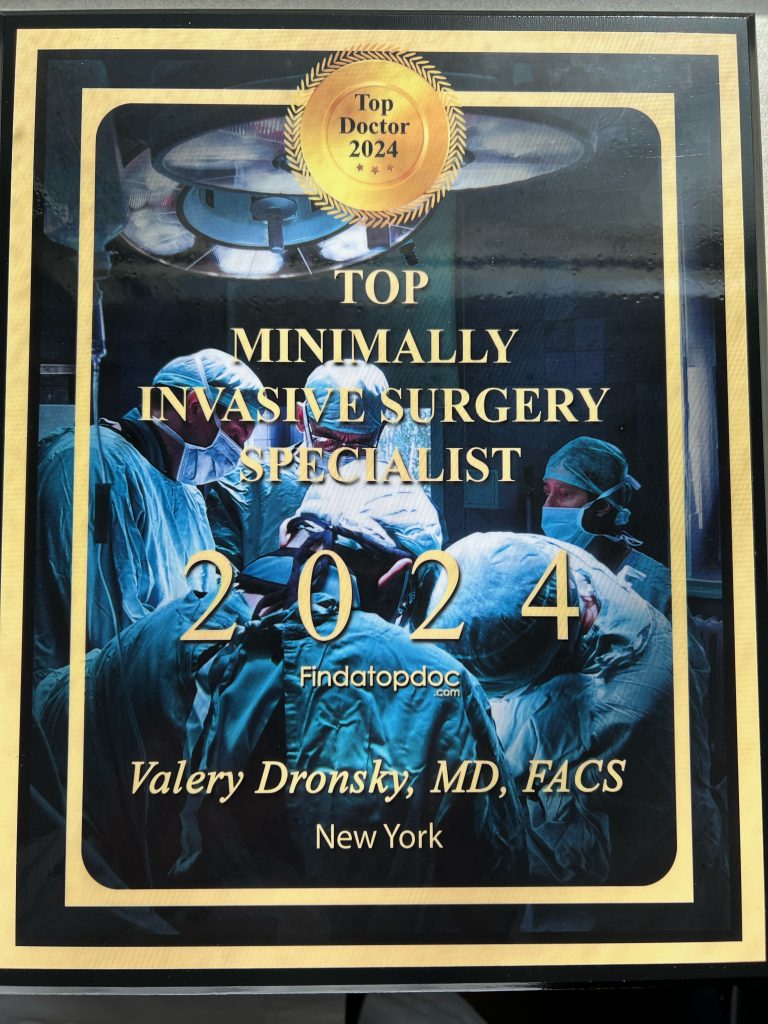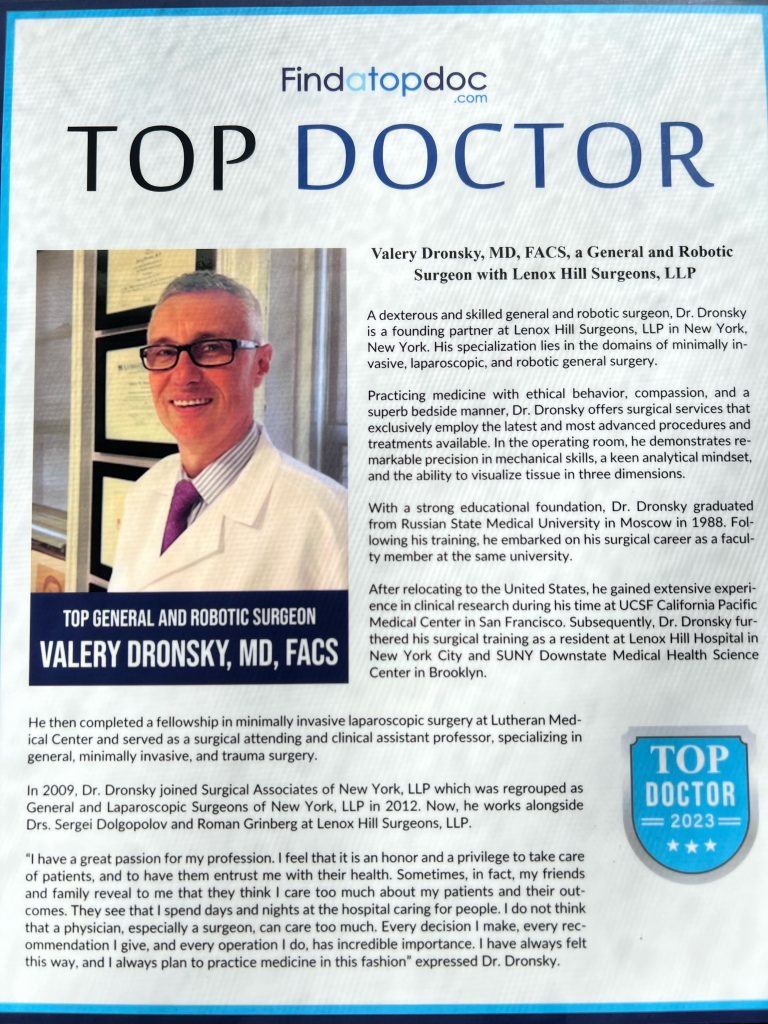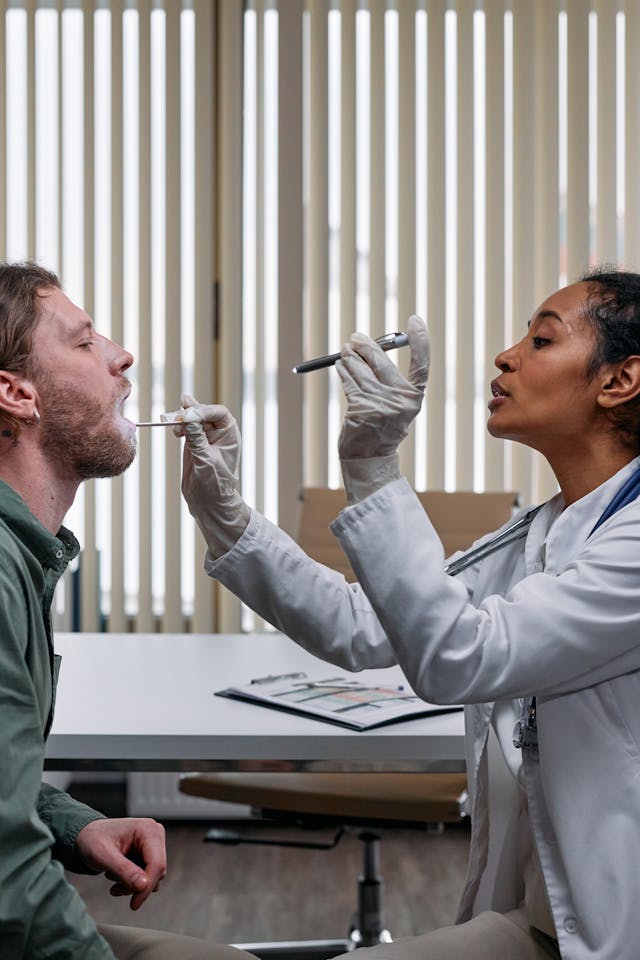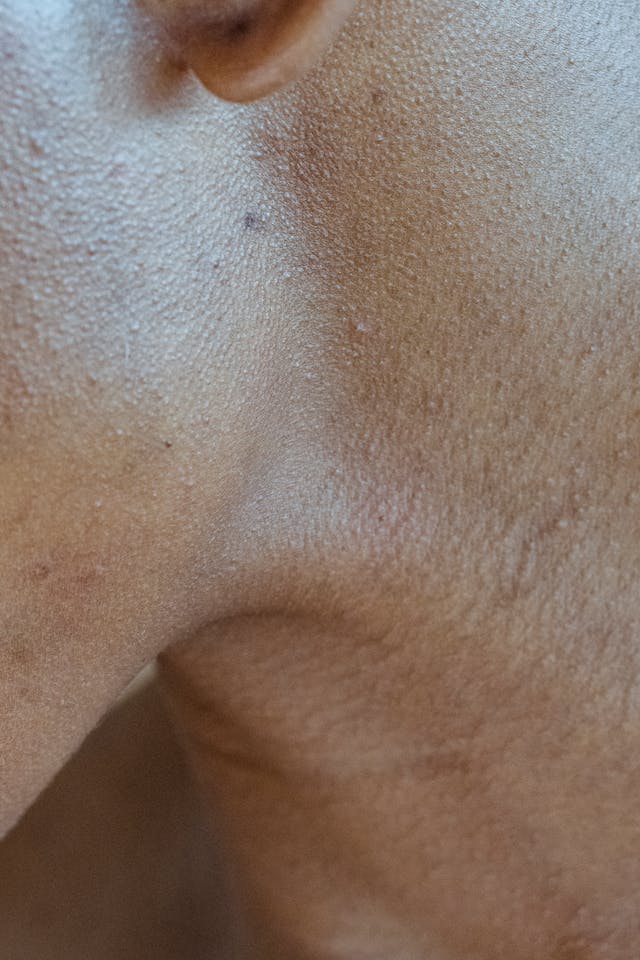CALL TODAY 646-846-1136 | EMAIL
Surgical Experts Dedicated to Improving Lives
At Lenox Hill Minimally Invasive Surgery PLLC, Dr. Valery Dronsky and his staff of medical professionals provide compassionate care with the highest ethical & professional standards. In our state of the art facility, we offer surgical services using only the most cutting edge and current procedures and treatments. We specialize in general surgery, including extensive experience in performing hernia repair surgery. Our expertise is in minimally invasive surgery and robotic surgery. Minimally invasive and robotic surgery often allow patients to experience easier recovery than traditional open surgery. They also allow for more precise and less traumatic surgery. When robotic and minimally invasive surgery is not an option, we are also skilled and experienced in traditional open surgical procedures.
Dr. Dronsky is an experienced and highly skilled surgeon having undergone extensive training in school, residency and fellowships. He practices medicine with ethical behavior, compassion and superb bedside manner. In the operating room he exhibits precision mechanical abilities, analytical thinking and the ability to visualize tissue in three dimensions. These innate and learned skills allow Dr. Dronsky to be one of the most dexterous and skilled professionals in New York City and the Country.
Call us: 646-846-1136
PATIENT TESTIMONIALS
Recent Awards
We are honored and deeply appreciative to have consistently received prestigious awards and recognition year after year, establishing us as one of New York’s foremost hospitals for a wide range of general surgeries, safety measures, specialized procedures, and overall excellence in healthcare. At Lenox Hill Minimally Invasive Surgery, our unwavering commitment lies in delivering exceptional care and unwavering support to our patients, guaranteeing their safety and successful recovery throughout their entire surgical experience.
Hospital Quality Awards
 America’s 50 Best Hospitals Award™ (2023, 2022)
America’s 50 Best Hospitals Award™ (2023, 2022)
Top 1% in the nation for providing the highest clinical quality year over year.

America’s 100 Best Hospitals Award™ (2021)
Top 2% in the nation for consistently delivering clinical quality year over year.

America’s 250 Best Hospitals Award™ (2023, 2022, 2021)
Top 5% in the nation for consistently delivering clinical quality.

Patient Safety Excellence Award™ (2023, 2022)
Top in the nation for providing excellence in patient safety by preventing infections, medical errors, and other preventable complications.
Specialty Clinical Quality Awards

America’s 100 Best Hospitals for Cardiac Care Award™ (2023, 2022, 2021, 2020, 2019)
Superior clinical outcomes in heart bypass surgery, coronary interventional procedures, heart attack treatment, heart failure treatment, and heart valve surgery.

America’s 100 Best Hospitals for Coronary Intervention Award™ (2023, 2022, 2021, 2020, 2019)
Superior clinical outcomes in coronary intervention procedures (angioplasty with stent).

America’s 100 Best Hospitals for Prostate Surgery Award™ (2023, 2022, 2021)
Superior clinical outcomes in prostate removal surgery and transurethral resection of the prostate.
Click to see all of our Healthgrades best doctors awards




Visit our main website at www.LenoxHillMinimallyInvasiveSurgery.com
Blog Posts are Below:
Monthly Archives: September 2024
Esophagus Surgery: Addressing Esophageal Conditions and Surgical Treatments
 What are the major esophageal conditions and surgical treatments? The esophagus, a vital part of the digestive system, is a muscular tube that connects the throat to the stomach. It plays a crucial role in the movement of food and liquids from the mouth to the stomach for digestion. However, several conditions can affect the esophagus, leading to discomfort, difficulty swallowing, and more severe health complications. In some cases, surgery may be required to treat these conditions and restore proper function.
What are the major esophageal conditions and surgical treatments? The esophagus, a vital part of the digestive system, is a muscular tube that connects the throat to the stomach. It plays a crucial role in the movement of food and liquids from the mouth to the stomach for digestion. However, several conditions can affect the esophagus, leading to discomfort, difficulty swallowing, and more severe health complications. In some cases, surgery may be required to treat these conditions and restore proper function.
So let’s now explore the various esophageal conditions that may require surgical intervention, the available surgical treatments, and what patients can expect during recovery.
Common Esophageal Conditions Requiring Surgical Treatments
Several esophageal disorders may necessitate surgery, either because other treatments have failed or because the condition poses a significant health risk. Here are some of the most common conditions that could lead to surgical intervention:
1. Gastroesophageal Reflux Disease (GERD)
GERD occurs when stomach acid frequently flows back into the esophagus, irritating the lining. This acid reflux can cause heartburn, regurgitation, and even damage to the esophagus over time. In severe cases where lifestyle changes and medication do not provide relief, surgery may be recommended.
The most common surgical procedure for GERD is fundoplication. During this procedure, the upper part of the stomach is wrapped around the lower esophagus to strengthen the esophageal sphincter, preventing acid from flowing back into the esophagus.
2. Achalasia
Achalasia is a rare disorder in which the esophagus loses its ability to move food toward the stomach due to damage to the nerves in the esophagus. The lower esophageal sphincter (LES), a muscle that allows food to enter the stomach, fails to relax properly, causing difficulty swallowing and food buildup.
Surgery for achalasia typically involves a Heller myotomy, a procedure in which the surgeon cuts the muscle at the lower esophagus to help it relax and open more easily. Sometimes, this surgery is performed in conjunction with a partial fundoplication to prevent acid reflux after the procedure.
3. Esophageal Cancer
Esophageal cancer, though less common, is a serious condition that often requires surgery as part of the treatment plan. Cancerous tumors in the esophagus can obstruct the passage of food and cause significant health complications.
The primary surgical procedure for esophageal cancer is esophagectomy, in which part or all of the esophagus is removed, and the stomach is pulled up to connect with the remaining portion of the esophagus or pharynx. In some cases, a portion of the intestine may be used to replace the removed esophagus. Esophagectomy is a complex surgery that is often accompanied by chemotherapy or radiation therapy as part of the cancer treatment plan.
4. Barrett’s Esophagus
Barrett’s esophagus is a condition where the lining of the esophagus changes due to prolonged acid exposure from GERD. While Barrett’s esophagus itself is not cancerous, it increases the risk of developing esophageal cancer. In cases where precancerous cells (dysplasia) are present, surgery may be recommended to prevent the progression to cancer.
The surgical procedure typically performed for Barrett’s esophagus with high-grade dysplasia is endoscopic mucosal resection (EMR), where abnormal cells are removed through an endoscope. In more severe cases, an esophagectomy may be required.
Surgical Treatments for Esophageal Conditions
Depending on the condition affecting the esophagus, different surgical options may be considered. Some of the most common esophageal surgeries include:
1. Laparoscopic Fundoplication
This minimally invasive procedure is often performed to treat GERD. The surgeon makes small incisions in the abdomen and uses specialized instruments to wrap the upper part of the stomach around the esophagus. Laparoscopic fundoplication offers the advantages of smaller incisions, shorter recovery times, and less postoperative pain compared to traditional open surgery.
2. Heller Myotomy
Used to treat achalasia, Heller myotomy can be performed laparoscopically, allowing for a quicker recovery and reduced scarring. In this procedure, the surgeon cuts the muscle at the lower end of the esophagus to help relax it, improving the ability to swallow. A partial fundoplication may also be done during this surgery to prevent future acid reflux.
3. Esophagectomy
For esophageal cancer or other severe esophageal conditions, an esophagectomy may be necessary. During this procedure, part or all of the esophagus is removed. This surgery can be performed through the chest, abdomen, or a combination of both, and is typically followed by reconstructive surgery to restore the digestive pathway using either the stomach or intestine.
4. Endoscopic Mucosal Resection (EMR)
EMR is a minimally invasive procedure used to remove early-stage cancerous or precancerous tissue from the esophagus. It is performed using an endoscope, a flexible tube with a camera and surgical tools, which is passed down the esophagus. This procedure allows for the removal of abnormal tissue without the need for major surgery, reducing recovery time and risk.
Recovery After Esophageal Surgery
 Recovery from esophageal surgery depends on the type of procedure performed and the patient’s overall health. Minimally invasive procedures like laparoscopic fundoplication or Heller myotomy typically involve shorter hospital stays, with patients often returning home within a few days. Full recovery may take several weeks, during which patients may need to follow a special diet to aid healing.
Recovery from esophageal surgery depends on the type of procedure performed and the patient’s overall health. Minimally invasive procedures like laparoscopic fundoplication or Heller myotomy typically involve shorter hospital stays, with patients often returning home within a few days. Full recovery may take several weeks, during which patients may need to follow a special diet to aid healing.
For more complex procedures like esophagectomy, recovery may take longer. Patients may require a hospital stay of several weeks, followed by months of rehabilitation. Dietary changes, physical therapy, and follow-up care are essential to ensure proper recovery and monitor for any complications.
Choosing the Right Surgeon for Esophageal Surgery
When considering esophageal surgery, it’s crucial to choose a surgeon with specialized expertise in treating esophageal conditions. Surgeons with experience in both traditional and minimally invasive techniques can offer personalized treatment plans tailored to each patient’s unique needs.
At Lenox Hill Minimally Invasive Surgery, our team is highly skilled in treating a wide range of esophageal conditions using the latest surgical advancements. Whether you’re dealing with GERD, achalasia, esophageal cancer, or another condition, our surgeons provide comprehensive care with a focus on patient safety and optimal outcomes.
For expert consultation and surgical treatment, contact Lenox Hill Minimally Invasive Surgery:
LENOX HILL MINIMALLY INVASIVE SURGERY
117 E 77th Street
Suite 1A
New York, NY 10075
646-846-1136
admin@lenoxmis.com
Visit our website for more information: https://lenoxhillminimallyinvasivesurgery.com/
Digestive Disorders and General Surgery: Treatment Options and Success Stories
What are some examples of digestive disorders and general surgery that can treat them? Digestive disorders can significantly impact a person’s quality of life, leading to symptoms like pain, discomfort, and difficulty with nutrition and digestion. While many digestive conditions can be managed with medication and lifestyle changes, some require surgical intervention to resolve the underlying issue and improve overall health. Advances in general surgery have allowed for more effective and less invasive treatment options, offering patients relief from chronic symptoms and a chance at a healthier, symptom-free life.
In this article, we will explore the most common digestive disorders that require surgical intervention, the treatment options available, and some success stories that illustrate the life-changing impact of general surgery.

Common Digestive Disorders Requiring Surgery
Digestive disorders are varied in their origin and severity. Here are some of the most common conditions that may necessitate surgical treatment:
1. Gallbladder Disease
Gallbladder disease, particularly the presence of gallstones, is a common digestive issue. Gallstones can block the bile ducts, causing intense pain and inflammation, a condition known as cholecystitis. In many cases, the best course of treatment is gallbladder removal surgery, or cholecystectomy, to prevent recurrent symptoms and complications.
Success Story Example
A 45-year-old patient experienced chronic pain after meals due to gallstones. After a minimally invasive laparoscopic cholecystectomy, she was able to return to her daily activities without pain and maintain a normal diet.
2. Gastroesophageal Reflux Disease (GERD)
GERD occurs when stomach acid frequently backs up into the esophagus, causing discomfort and, over time, damage to the esophageal lining. For patients whose GERD is not managed with medication, surgery may be necessary. Fundoplication, where the top part of the stomach is wrapped around the lower esophagus, strengthens the valve between the esophagus and stomach, reducing reflux.
Success Story Example
A young professional in her 30s struggled with acid reflux that affected her sleep and daily functioning. After undergoing laparoscopic fundoplication, her symptoms were completely resolved, and she no longer required daily medication.
3. Hernias
A hernia occurs when an organ pushes through a weakened area in the muscle or tissue, often in the abdominal wall. In some cases, hernias can cause pain, obstruction, or other serious complications. Surgery is the definitive treatment for hernias, particularly inguinal hernias, which occur in the groin. Hernia repairs can be performed via open surgery or using minimally invasive laparoscopic techniques.
Success Story Example
A patient with a recurrent inguinal hernia that limited his ability to exercise underwent robotic-assisted hernia repair. The surgery allowed him to recover faster, and within weeks he was back to his normal workout routine, free of pain and discomfort.
4. Crohn’s Disease and Ulcerative Colitis
Crohn’s disease and ulcerative colitis are inflammatory bowel diseases (IBD) that cause inflammation in the digestive tract. In severe cases, these conditions can lead to complications such as bowel obstructions, perforations, or the development of fistulas. Surgery, such as bowel resection, may be required to remove damaged portions of the intestine and restore normal digestive function.
Success Story Example
A 28-year-old woman with severe Crohn’s disease underwent a bowel resection after multiple hospitalizations due to obstructions. Post-surgery, she reported a dramatic improvement in her quality of life and was able to achieve remission, maintaining an active lifestyle without flare-ups.

5. Diverticulitis
Diverticulitis occurs when small, bulging pouches (diverticula) in the colon become inflamed or infected. Mild cases can be managed with antibiotics, but recurring or severe cases may require surgery. Colectomy, the removal of the affected portion of the colon, is often performed to prevent future episodes of diverticulitis.
Success Story Example
After years of battling recurrent diverticulitis, a patient opted for elective surgery to remove the affected section of the colon. Following the surgery, he remained symptom-free and was able to enjoy a fiber-rich diet without fear of future flare-ups.
Minimally Invasive Surgical Techniques
One of the greatest advancements in general surgery has been the development of minimally invasive techniques. Procedures such as laparoscopy and robotic-assisted surgery have transformed how many digestive disorders are treated, offering patients significant benefits, including:
- Smaller incisions
- Less pain
- Reduced risk of infection
- Faster recovery times
- Minimal scarring
These techniques are particularly beneficial for surgeries involving the gastrointestinal tract, as they allow surgeons to perform complex operations with precision, while minimizing trauma to the surrounding tissues.
The Importance of Early Surgical Intervention
For many digestive disorders, early surgical intervention can prevent complications and improve outcomes. Delaying surgery in cases of severe GERD, gallbladder disease, or inflammatory bowel disease can lead to worsened symptoms, more complex surgeries, and prolonged recovery periods. Consulting with a general surgeon early in the course of the disease can provide patients with a comprehensive understanding of their condition and treatment options, including whether surgery is the best choice.
Post-Surgical Recovery and Success
The recovery process after general surgery for digestive disorders depends on the complexity of the procedure and the individual’s overall health. Minimally invasive procedures typically allow for shorter hospital stays and faster recovery times. Many patients are able to return to normal activities within a few weeks, and dietary restrictions are usually temporary.
A key component of post-surgical recovery is follow-up care, where patients may receive dietary advice, exercise recommendations, and guidance on managing any lingering symptoms. With appropriate surgical intervention and recovery support, many patients experience significant improvements in their quality of life, often returning to a normal routine free of pain and discomfort.
Digestive Disorders and General Surgery: Conclusion
Digestive disorders can have a profound impact on a person’s well-being, but with the right surgical treatment, patients can regain control of their health and experience long-lasting relief. From minimally invasive techniques for GERD and gallbladder disease to complex surgeries for conditions like Crohn’s disease and esophageal cancer, modern general surgery offers a range of effective treatment options.
If you’re considering surgery for a digestive disorder, consult with a team of highly trained general surgeons who specialize in these procedures to explore the best treatment options for your specific condition.
Contact Lenox Hill Minimally Invasive Surgery today to schedule a consultation and learn more about how their expertise can help you on the path to recovery.
Contact Information
LENOX HILL MINIMALLY INVASIVE SURGERY
117 E 77th Street
Suite 1A
New York, NY 10075
646-846-1136















